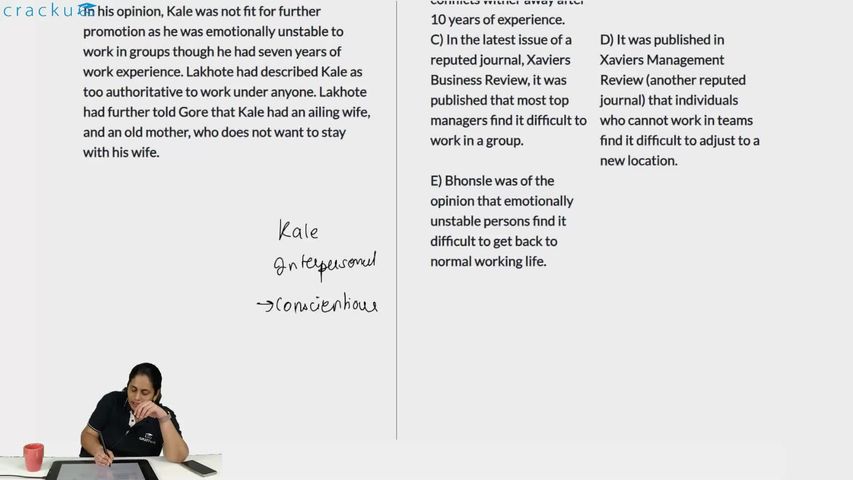Marathe is a Vice President in a construction equipment company in the city of Mumbai. One day, his subordinate Bhonsle requested that Kale, a project manager, be transferred to the Chennai office from the Mumbai office. In Chennai, Kale would work alone as a researcher. Bhonsle gave the following reasons for his request: "Kale is known to frequently fight with his colleagues. Kale is conscientious and dedicated only when working alone. He is friendly with seniors, but refuses to work with colleagues, in a team. He cannot accept criticism and feels hostile and rejected He is over-bearing and is generally a bad influence on the team."
Marathe called upon Gore, another project manager, and sought further information on Kale. Gore recalled that a former colleague, Lakhote (who was also Kale's former boss) had made a few remarks on his appraisal report about Kale. In his opinion, Kale was not fit for further promotion as he was emotionally unstable to work in groups though he had seven years of work experience. Lakhote had described Kale as too authoritative to work under anyone. Lakhote had further told Gore that Kale had an ailing wife, and an old mother, who does not want to stay with his wife.
Consider the following solutions to the problem mentioned above:
1. Marathe should transfer Kale to Chennai office
2. Marathe should try and verify the facts from other sources as well
3. Kale should be sacked
4. Kale should be demoted
5. Marathe should suggest Kale to visit a family counselor
Which of the following statements, if true, would weaken the decision to sack Kale the most?
Option A is negated because the major concern was Kale’s inability to work competently in a team and not his conflicting responsibilities at home and office. Kale was facing personal problems at home and option B states that employees’ problems at home affect their performance at work. This strengthens the argument rather than weakening it by citing one more reason to sack Kale. Option D is incorrect because if it holds true than it wipes out the possibility of sending Kale to some other location for work and does leave the management with the only option of sacking him. Option E is eliminated because it again strengthens the argument as the caselet clearly says that Kale was emotionally unstable. Option C is the correct choice as the report in the journal indicates that most managers find it difficult to work in a group. Even if Kale is sacked and a new manager is hired in his place, it is likely that the new manager may face the same problem (of not being able to work in a group). And hence it will not be a good business decision to sack Kale. Therefore, option C weakens the argument and is the correct answer.
Video Solution

Create a FREE account and get:
- All Quant Formulas and shortcuts PDF
- 15 XAT previous papers with solutions PDF
- XAT Trial Classes for FREE




